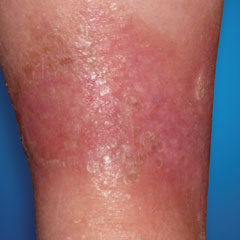
 Varicose Veins: Skin Discoloration From Advanced Venous Reflux
Varicose Veins: Skin Discoloration From Advanced Venous Reflux
Varicose veins, skin discoloration occurs during the more advanced stages of venous reflux. The initial redness is from inflammation. As blood continues to pool under the skin, the breakdown of red blood cells causes the skin damage to advance and take on a tan or reddish-brown appearance.
How Can I Tell if I Have Varicose Veins Skin Discoloration?
Blood pools in the legs from untreated dilated vein conditions, such as varicose veins. Skin discoloration is often first noticeable around the ankles or low calves. Discoloration also frequently occurs over the shins and on the feet.
Skin discoloration that worsens can change from a reddish color to a tan or reddish-brown color and the skin can become painful, hardened, and scar-like. While it may take years of untreated venous disease for skin discoloration to worsen to such a degree, in can also occur suddenly and without warning.
What Causes Skin Discoloration?
The most common features of venous disease are dilated vein conditions like spider veins and varicose veins. Skin discoloration occurs during the progressive stages of venous reflux, a condition in which blood flows backwards in a vein and pools inside it, causing the vein to expand, or dilate.
Venous reflux associated with varicose veins is most likely caused by abnormalities in the vein wall, although it can also be attributed to a condition called valvular incompetence, in which the tiny valves inside veins that control the flow of blood become damaged and blood is allowed to flow backwards and pool. Varicose veins are probably caused by an abnormality in the vein wall in conjunction with valvular incompetence.
Venous reflux and other venous diseases can be influenced by several factors:
- Genetics — The number one factor that contributes to venous disease
- Pregnancy — Elevated blood volume, hormone levels and pressure on the leg veins due to an enlarging uterus
- Gender — Women are statistically more susceptible to venous disease
- Injury or surgery (especially near the pelvis) — Blood flow can become restricted if a vein is damaged
- Prolonged sitting or standing — Sedentary lifestyles and certain sitting or standing occupations cause inactivity in muscles that help pump blood back to the heart
- Obesity or weight gain — Venous disease can progress faster in patients that carry excessive weight
- Blood clot — A blood clot can block the flow of blood through a vein
Varicose Veins Skin Discoloration: Signs and Symptoms
Pooling of blood in the legs caused by venous reflux can result in several symptoms:
- Irritated and inflamed skin
- Redness
- Itching
- Dryness
- Oozing fluid
- Scaling
- Open sores
- Crusting or scabbing
In some people with advanced venous reflux from varicose veins, skin discoloration symptoms become more severe. In such cases, an area of very painful skin can develop, the skin typically turns red or brown, and the skin becomes hardened like a scar. Severe symptoms normally result from years of untreated venous disease. However, in some people they can occur suddenly.
Treatment for Skin Discoloration and Other Venous Diseases
Because skin discoloration results from the advanced stages of venous disease, the condition will take some time to heal after the cause of venous reflux is treated.
Possible treatments for the underlying venous disease that causes skin discoloration include endovenous ablation therapy, foam sclerotherapy, and ambulatory phlebectomy.
Once the underlying venous disease has been addressed, fresh, oxygenated blood will return to the damaged tissues, preventing further skin discoloration and repairing the tissues over time. Repair of damaged tissues is gradual. We do not expect the natural skin color to return. Our goal is to keep the damaged skin from worsening.
Have Questions?
You can read more about skin discoloration in our FAQ. For more information about VasCare and how we can help you, contact us or call our offices at:
Beaumont Clinic – 409.924.8600
Corpus Christi Clinic – 361.882.4000